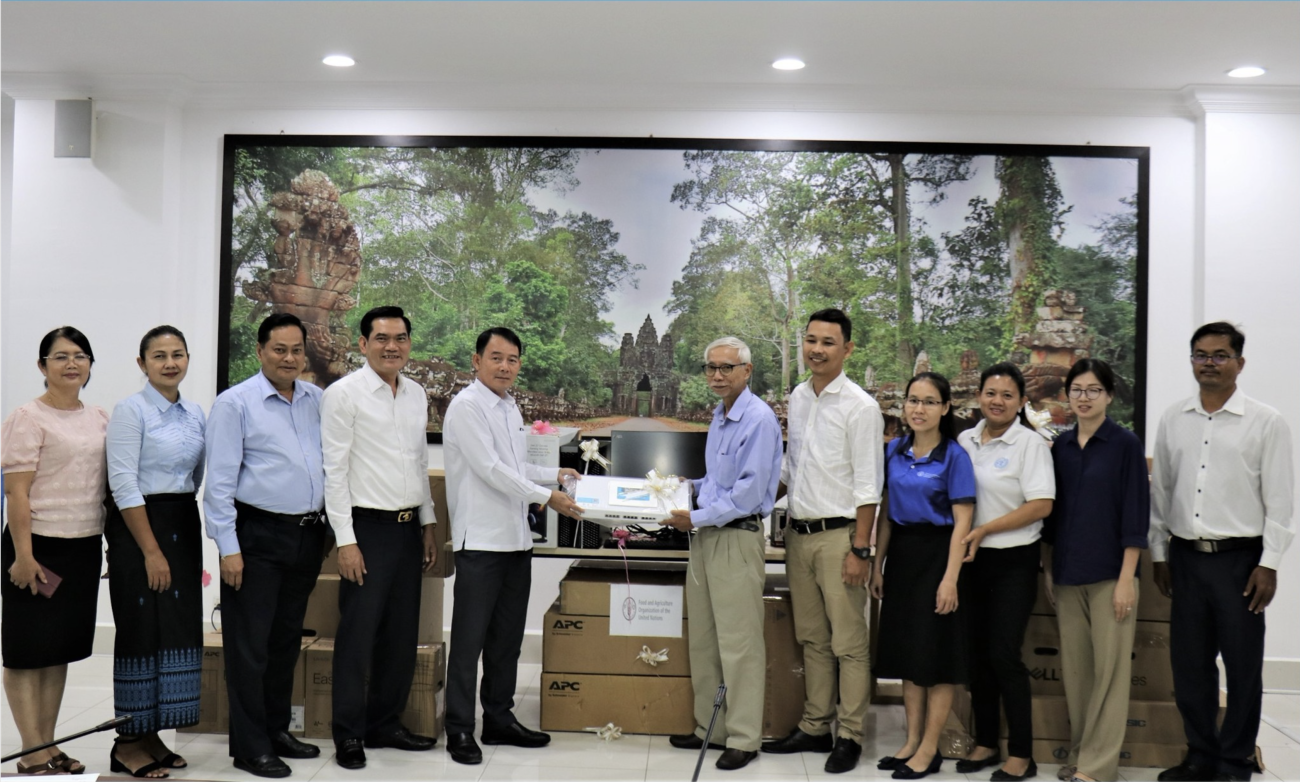FAO hands over equipment to strengthen Cambodia’s capacity for transparency on nationally determined contributions reporting

Story from FAO Cambodia
|
The Food and Agriculture Organization of the United Nations has handed over a set of server database stations and information technology equipment including software, to the General Directorate of Natural Protected Areas (GDNPA) of the Royal Government of Cambodia’s Ministry of Environment. The provision of equipment is aimed at boosting Cambodia’s capacity for transparency on reporting of nationally determined contributions (NDCs). Cambodia submitted its nationally determined contributions to the United Nations Framework Convention on Climate Change secretariat (UNFCCC) in 2015, articulating the country’s efforts to reduce national greenhouse gas emissions and to adapt to climate change in line with the long-term goals of the Paris Agreement. Development and strengthening of monitoring and reporting systems and processes are key contributors to ensuring transparency of actions undertaken by Cambodia, in line with the principles of NDC reporting as stipulated by the UNFCCC. This equipment will enhance the existing monitoring, reporting and verification management information system, helping to take the country a step closer towards improved monitoring and reporting on protected areas, on agriculture, forestry and other land use and enhanced transparency on NDCs in line with the UNFCCC requirements.
Cambodia faces a number of barriers to effective reporting in compliance with the UNFCCC enhanced transparency framework requirements. These include the lack of activities data, lack of information on local emission factors and limited data sharing mechanisms for reporting. This equipment will help to address these barriers, enhancing institutional capacity and supporting effective mechanisms for data compilation and sharing across ministries which will enable production of more timely and accurate reports for the UNFCCC processes and particularly the reporting requirements under the Paris Agreement enhanced transparency framework.
The Monitoring Reporting and Verification Management Information System plays a critical role in ensuring transparency of climate action reporting in the agriculture and land-use sectors to address climate change impacts and drivers. The enhanced capacity will meet the critical needs of the GDNPA both on statistical and geospatial data and will contribute to piloting of a near real-time monitoring system.
Next steps As a follow up to this support, FAO will continue to collaborate for strengthened organizational capacities and whole-of-government coordination. Improving measurement, reporting and verification and monitoring and evaluation systems, and the costing of proposed options are activities that will be carried out to strengthen the conditions for implementing NDC actions. In this regards, follow up activities will include but not be limited to coordination of setting up of the management information system and capacity building for system administrators and support for data quality assurance and also testing and integration of the near real-time monitoring system. The support to GDNPA was made possible with financial assistance from the Global Environment Facilitythrough the project Strengthening Capacity in the Agricultural and Land Use Sectors for Enhanced Transparency in Implementation and Monitoring of Cambodia’s Nationally Determined Contribution, the UNREDD programme through the Initiative for Promoting Sustainable Forest Trade in the Lower Mekong Region project, and by the German Federal Government International Climate Initiative through the Scaling up Climate Ambition on Land Use and Agriculture through NDCs and NAPs project. Through these interventions, FAO is contributing to the achievement of the sustainable development goals, Global Goals, in Cambodia, specifically Goal 13-Climate Action and Goal 15-Life on Land. The equipment was officially handed over on 24 August 2023. |



